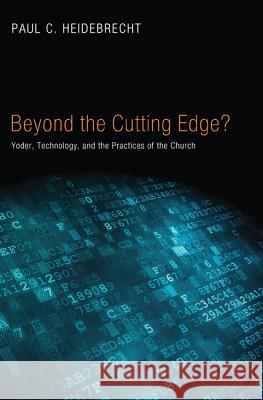Beyond the Cutting Edge?: Yoder, Technology, and the Practices of the Church » książka
Beyond the Cutting Edge?: Yoder, Technology, and the Practices of the Church
ISBN-13: 9781620328118 / Angielski / Miękka / 2014 / 254 str.
Beyond the Cutting Edge?: Yoder, Technology, and the Practices of the Church
ISBN-13: 9781620328118 / Angielski / Miękka / 2014 / 254 str.
(netto: 139,75 VAT: 5%)
Najniższa cena z 30 dni: 144,74
ok. 16-18 dni roboczych.
Darmowa dostawa!
A quick scan of any newsstand is enough to confirm the widespread preoccupation with technological change. As a myriad of articles and advertisements demonstrate, not only are we preoccupied with technology, but we are bombarded with numerous reminders that the cutting edge is in constant motion. Most often the underlying assumption of Christians is that we have no choice but to find ways to cope with the latest and greatest. Indeed, it is often assumed that the church has no choice but to find ways to cope with its new technological context. This book does not make the same assumptions. Building on the work of Mennonite theologian John Howard Yoder, it argues that the practices of the church make it possible for Christians to conscientiously engage technology. This happens when we recognize that marks of the church such as patience, vulnerability, and servanthood can put technological ideals such as speed, control, and efficiency in their proper place. In the course of grappling with three examples of morally formative technologies--automobiles, genetically modified food, and the Internet--this book goes beyond Yoder's thought by emphasizing that the church also plays a crucial role in our moral formation. "Paul Heidebrecht establishes what few others notice: technology is not merely neutral but is a moral and theological concern. It definitively shapes and at times even distorts our needs, desires, communities, and lives. By pondering Christian doctrines and practices in the face of daunting dilemmas and choices, Heidebrecht demonstrates that the good and abundant life is still within reach." --Arthur Boers, author of Living into Focus "This informed and incisive book not only shows that Yoder is relevant for thinking about technology but also casts new light on Yoder's work by bringing it into dialogue with some of the best writings on the subject. Much in the book will spark needed conversations, both about Yoder and our discerning use of technologies. I was quite taken with Heidebrecht's insightful critique of Yoder as engineer of the life of the church. A valuable book." --Mark Thiessen Nation, author of John Howard Yoder "Can powerful theology meet the force of technology? It's a most urgent question for Christians. Paul Heidebrecht has worked out a careful and thoughtful answer, an answer that inspires hope and opens up new ways for constructive work." --Albert Borgmann, author of Real American Ethics Paul C. Heidebrecht is the Ottawa Office Director for Mennonite Central Committee Canada, and holds a PhD in Theological Ethics from Marquette University.
A quick scan of any newsstand is enough to confirm the widespread preoccupation with technological change. As a myriad of articles and advertisements demonstrate, not only are we preoccupied with technology, but we are bombarded with numerous reminders that the cutting edge is in constant motion. Most often the underlying assumption of Christians is that we have no choice but to find ways to cope with the latest and greatest. Indeed, it is often assumed that the church has no choice but to find ways to cope with its new technological context.This book does not make the same assumptions. Building on the work of Mennonite theologian John Howard Yoder, it argues that the practices of the church make it possible for Christians to conscientiously engage technology. This happens when we recognize that marks of the church such as patience, vulnerability, and servanthood can put technological ideals such as speed, control, and efficiency in their proper place. In the course of grappling with three examples of morally formative technologies--automobiles, genetically modified food, and the Internet--this book goes beyond Yoders thought by emphasizing that the church also plays a crucial role in our moral formation."Paul Heidebrecht establishes what few others notice: technology is not merely neutral but is a moral and theological concern. It definitively shapes and at times even distorts our needs, desires, communities, and lives. By pondering Christian doctrines and practices in the face of daunting dilemmas and choices, Heidebrecht demonstrates that the good and abundant life is still within reach."--Arthur Boers, author of Living into Focus"This informed and incisive book not only shows that Yoder is relevant for thinking about technology but also casts new light on Yoders work by bringing it into dialogue with some of the best writings on the subject. Much in the book will spark needed conversations, both about Yoder and our discerning use of technologies. I was quite taken with Heidebrechts insightful critique of Yoder as engineer of the life of the church. A valuable book."--Mark Thiessen Nation, author of John Howard Yoder "Can powerful theology meet the force of technology? Its a most urgent question for Christians. Paul Heidebrecht has worked out a careful and thoughtful answer, an answer that inspires hope and opens up new ways for constructive work."--Albert Borgmann, author of Real American EthicsPaul C. Heidebrecht is the Ottawa Office Director for Mennonite Central Committee Canada, and holds a PhD in Theological Ethics from Marquette University.











